Tagged: Plays
Elle at the PTE
- by Alyson Shane
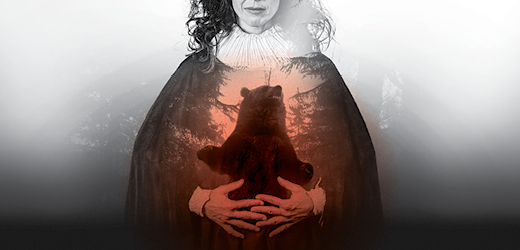
There are few things as powerful as a strong one-person performance, and while Severn Thompson's performance in Elle wasn't completely solo, the 90 minutes that she spent on the stage, almost entirely on her own, were appropriately gripping and moving.
Exploring French-Canadian History
Elle is a theatre adaptation of the Douglas Glover’s 2003 novel of the same name which is currently playing at the Prairie Theatre Exchange. The story focuses on the tale of harrowing survival in pre-colonial Canada, and weaves in themes of feminism, magic, and terror into a gripping performance that demands to be seen.
The play, and the novel upon which the play is based, are an interpretation and expansion of the incredible story of Marguerite de La Rocque de Roberval, played by Severn Thompson, a French noblewoman who travelled to Canada and was marooned on the Isle of Demons, a phantom island, an island off the coast of Newfoundland. She was marooned by the captain of the ship, her relative, who dumped her overboard as punishment for taking a lover during the voyage.
Marguerite is joined by her lover Richard, her maid Damienne, and a boat full of broken tools. Discovering that she is pregnant, she struggles through a series of hardships as her pregnancy progresses: Richard becomes ill and dies; Damienne, too, eventually succumbs to starvation and sickness, and, pregnant and alone, Marguerite's spirit begins to break.
A character who began as a confident and aloof young woman is suddenly left to face the harsh Canadian winters alone, and Thomson's portrayal of a woman whose spirit is breaking in front of you is chilling take on dark humour, to say the very least. As she climbs inside the skin of a bear, worn-out, cold, and ready to give up, she is discovered.
Itslk, played by Johnathan Fisher, is an Indigenous hunter who believes that Marguerite is a spirit, having watched her emerge from inside the bear. He teaches her how to hunt and cook meat, and the real and spirit world begin to blend as Marguerite becomes more in touch with her newfound home.
Intimate and Gripping
Being the sole (or largely solo) actor on stage can be daunting, and often falls flat, but Thompson's depiction of a woman going through a traumatic experience and surviving managed to be both alarming and darkly funny. At times, when Thompson is describing their dire state on the island, living off of “books, bird bones and tennis balls” you almost feel bad for laughing as she trounces around the stage.
The most striking part of the performance, however, was how the stage was integrated with the story. The entire play takes place in front of a large structure which resembles a rib cage (an homage to the bear Marguerite finds, perhaps?) and is the perfect play to see at the Prairie Theatre Exchange because of the smaller stage size and the intimate setting.
By using a long sheet and wrapping it in various ways around the structure the stage is transformed from a ship, to a tiny tent, to the belly of a bear, and more. At one point, while Thompson wound herself up inside the sheet, crying out, it could almost be believed that she was truly losing her sanity.
Elle is a play worth seeing, and a reminder of the hardships that faced both colonists and Indigenous peoples alike all those centuries ago.
In My Community: Mom's the Word at the Prairie Theatre Exchange
- by Alyson Shane
I'm not going to lie to you: I had some reservations about seeing this play (for those of you that don't know, I've been no-contact (NC) with my parents since February of 2015.)
As a result, the idea of seeing a play about motherhood - something that I have yet to experience, and have thus far only really had negative experiences with - gave me some anxiety. I wasn't sure if I wanted to see the play because I worried that listening to stories of motherhood - of love, of unconditional caring and support - would hurt too much.
However, I also realized that it would be a good opportunity to face a fear (and support the Prairie Theatre Exchange*, which I'm always happy to do), so off we went to check out Mom's the Word.
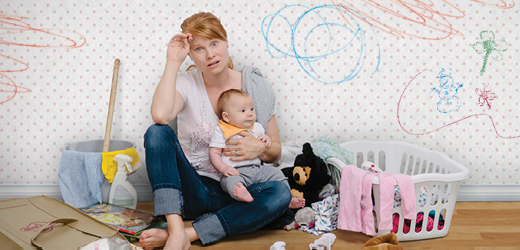
Image via PTE
A play by moms, for moms
Mom's the Word was conceived by a group of actresses and moms living in Victoria, BC in 1995, who all came together to share their stories of the trials and tribulations of motherhood. Together, they pooled their experiences and stories to form a cabaret-style, musical-ish play of sorts which touches on a variety of issues, including: postpartum depression, diapers (and diaper bags), panic, discipline, sex, changing bodies, and much more.
The play opened with a monologue from Jill (played by Yumi Ogawa) about childbirth which was... terrifying, to say the least. I've never had children, but I hope to someday, and seeing such a raw performance of the anxiety, stress, and sheer animalistic power of birthing was a bit unnerving. But, at the same time, it felt oddly inclusive; like this was a trial that every mother goes through, and an experience that is uniquely female.
One of the other mothers, Robin (played by Lisa C. Ravensbergen), gave a hilarious monologue in which she described how she and her equally foul-mouthed partner accidentally taught their child to swear at an early age.
"I tell people he's just saying 'truck' and can't pronounce it properly" she laughs, looking exasperated and embarrassed. This hit home: both John and I include "colourful words" in our everyday vocabulary, and have no shame about it, but the outside perception that we may teach our kids "bad words" too soon in their lives, and be judged for it, is something I've thought about. It felt like such a relief to hear someone addressing it!
Women supporting women
The thing that I loved the most about Mom's the Word, though, was the focus on empowerment through storytelling. Motherhood (from what I can tell) seems like it can be a tremendously isolating experience at times, and it was encouraging to see the moms in the story reaching out and supporting one another.
These struggles were covered really well in the monologues delivered by Jill's character. Over the course of the play she narrates 'letters' to her husband, trying to explain and make sense of the different experiences they're both having (staying at home with the kids vs. maintaining a demanding career) which were, at times, utterly heartbreaking.
"How can I explain what my day was like to you?" she asks "most of my day is spent in silence; how can I put the look our baby and I shared into words?" As John, who came with me, gripped my hand I realized that these were going to be very real issues that I would one day have to face and make sense of, myself.
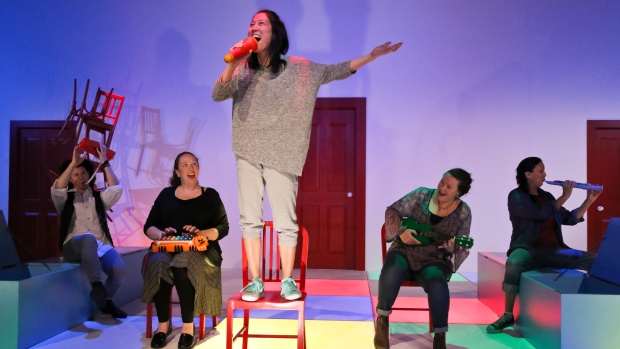 Image via CBC Manitoba
Image via CBC Manitoba
Laughter as medicine
The play wasn't all sad monologues and stressing out about dirty diapers; in fact, Mom's the Word presented the topic of motherhood in unabashed, shameless, hilarity.
In one scene, Alison (played by Trish Cooper) walks onstage jiggling a carrier as she tries to lull her infant (who was born prematurely) to sleep. Her baby falls asleep, but her muscle memory causes her to keep jiggling for several minutes as she addresses the audience. In another, Deborah (played by Jenny Wasko-Paterson) struggles through oral sex (taking bites of a banana onstage) as she says things like:
"I still want you to feel good"
"Oh no, I don't mind. I feel sexy when you feel sexy..." *eye roll*
This monologue is clearly demonstrating the struggles that many moms have with reconciling how tired, worn-out, and unsexy they feel, and the struggle to maintain a sexual relationship with their male counterparts who aren't feeling the same strain. Again, this is an area that worries me as a potential future-mom, and I appreciated that it was addressed and normalized within the context of the play.
The stand out scene for me, however, was one in which Deborah's character took her young son to the local pool. Her interactions with the toddler-age child, the fumbling, the mess, and the hilarious antics which ensued reminded me so much of being a young person, and spending my summers in the daycare my mom ran out of our house, which was always filled with toddlers exhibiting the exact behaviours described in the play.
As someone who doesn't yet have children and has a lot of mom-related baggage, Mom's the Word struck a series of chords that I didn't realize where inside of me. Yes, it was hard to watch some points, but the actors put words to many of the fears and anxieties that I have about motherhood, and presented difficult and stressful scenarios as ones which felt relatable, even to a non-mom like me.
Mom's the Word reassured me that, even if the world of parenting is going to be 'trucking' hard sometimes, at least I'll be able to laugh about it.
----
Mom's the Word is currently playing at PTE until November 27, 2016.
* Disclaimer: I get free tickets to see plays at the PTE in exchange for writing these reviews (it's wonderful)
In My Community: SPIN (or, I saw the strangest play last night)
- by Alyson Shane
Last night, despite frigid temperatures and hostile winds, John and I trekked out to the Prairie Theatre Exchange to check out the opening night of SPIN, an unusual spoken-word, musical, theatrical oddball of a play featuring a string section, two guitars, a projector, and a bicycle as an instrument.
It was by far the weirdest play I've ever seen, and I totally loved it.
For those of you who don't know me personally, I'm obsessed with riding my bike. I first got into cycling as an adult when the guy I was seeing at the time and I purchased matching his & hers vintage road bikes for $40. They were named Vikki & Vance, and I loved them.
A few years later an unfortunate (car) accident led to me purchasing my current velocipede, Barbara Streisand, whom I now ride all over town the moment the weather allows it. I love cycling; it's an amazingly freeing and fun activity, and there are literally few things that I love more than riding my bike around on a warm day in the sunshine.
So, naturally when I was offered free tickets to see SPIN, a play about cycling, I jumped at the opportunity.
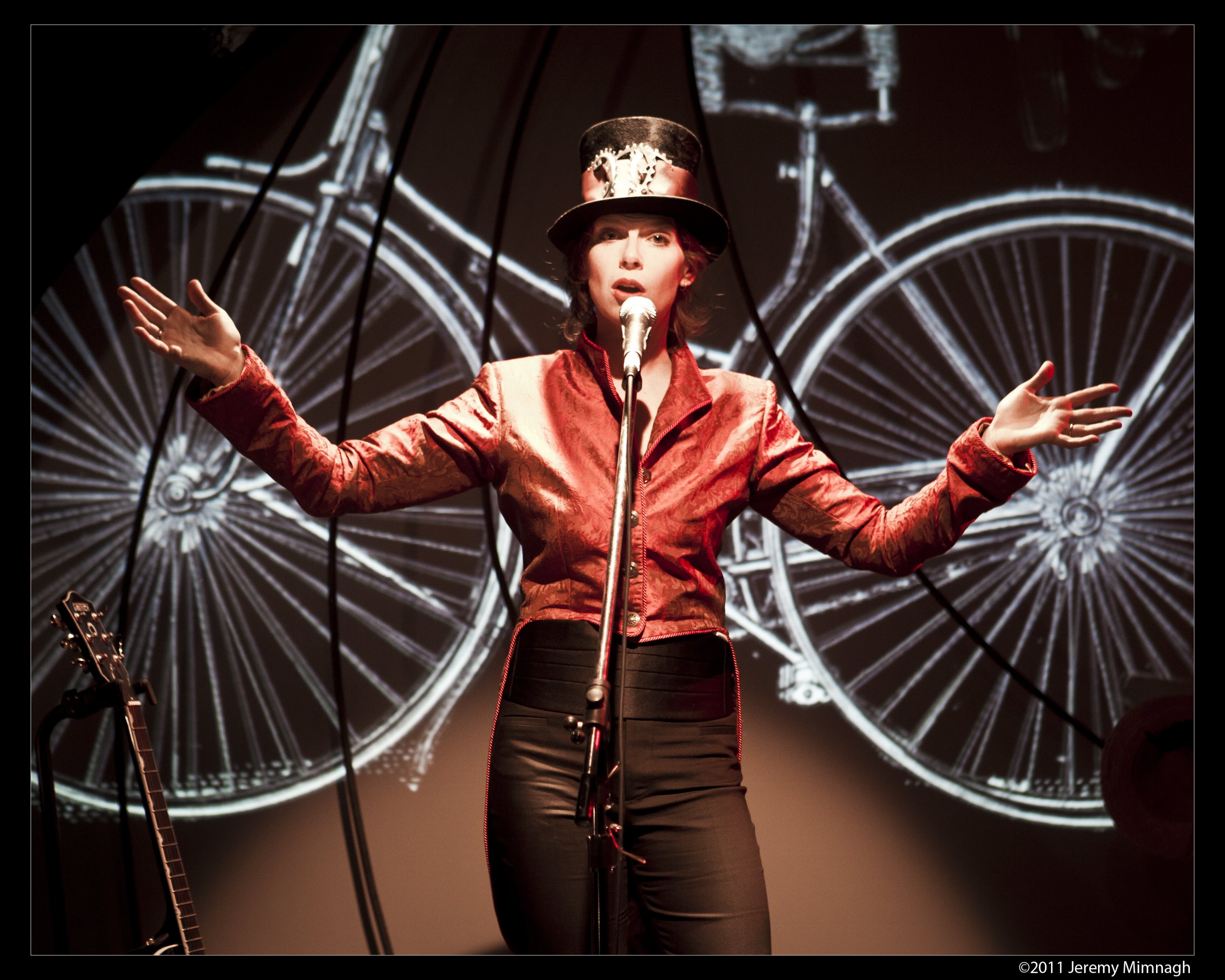
What's so good about a play about the bicycle?
What I didn't know about the bicycle before attending the play was this: the bicycle, in fact, was an important instrument for social change during the women's suffrage movement.
At the opening of the play, which is sort of a mash-up of ballads, catchy songs, and spoken-word pieces, Evalyn Parry emerges and does an impressive recital of Instructions on Learning to Ride a Bicycle, a pamphlet published by Miss Frances Willard, one of the most important suffragettes in history. After learning to ride a bicycle at 51 years old, she was so taken with this efficient mode of self-transportation that she wrote a pamphlet about it, declaring that "all women must all learn to ride, or fall into the sluiceways of oblivion and despair."
Wow. It definitely puts getting on my bike and rollin' around town feel a little less frivolous.
Not only are the stories that Parry weaves together hilarious, fascinating, and inspiring, but her vocals and guitar are backed up by... you guessed it, a bike. Brad Hart, Parry's accompanist who sports a fitting handlebar moustache, literally brings a vintage CCM bicycle to life by playing it like an instrument, suspended on a stand and connected to contact microphones.
The variety of sounds Hart can produce on a bicycle is, to say the least, a little mind-blowing. By using a combination of drum sticks, tuned bells, the spokes, frame, seat, and even the wheels themselves, he adds a unique and fitting element to Parry's songwriting.
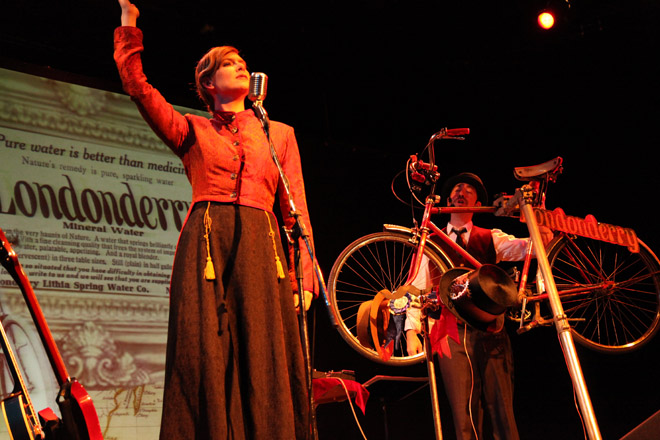
The bicycle as an instrument of social change
SPIN is inspired in part by the amazing true story of Annie Londonderry, the first woman to ride around the world on a bicycle in 1894. Not only was 23 year old Annie Londonderry (not her real last name, Londonderry Lithia was a mineral water manufacturer who sponsored her ride) unusual in that she accepted this unusual challenge, leaving her three kids and husband behind in Boston, but what I found striking (and ingenious) was that she scheduled press events everywhere she went. She sold advertising space all over her clothes and her bike - what a hustler!
This is just one of the examples that Evalyn Parry uses to illustrate how important the bicycle became to women in the late nineteenth century; for the first time ever women had a quick, easy, and most importantly an independent method of getting around.
The bicycle did more than just give ladies a way to get around, however: it also changed the way that we dressed. Using Annie Londonderry as an example of this sartorial shift, Parry paints a hilarious scene of Londonderry riding into a city and blowing people's minds with her masculine attire and her penchant for not giving a damn about it, thank you very much.
"Taking your life into your own hands"
One of the recurring themes throughout the play is the idea that the rider is connected to the bicycle, and that it allows them the freedom to go where they want, whenever they want, on their own terms. Parry weaves the idea of using your heart to move yourself around on your bike, and the idea that the bicycle and all it represents is connected to you as you ride around, beautifully.
"Taking your life into your own hands" also has a double meaning, referring to the suffragette movement and women's rights. As Parry points out throughout the play women's rights are the result of women "taking their lives into their own hands" and not allowing it to be dictated by men, and that the bicycle was one of the first ways in which women were able to start asserting their own independence in stodgy Victorian society.
Two-wheeled words/to wield words
To be honest, when I agreed to see the play I didn't quite know what I was signing up for, but I certainly didn't expect a cabaret-style, spoken-word/musical history lesson on women's rights featuring a bicycle as a backup instrument.
More importantly, however, SPIN made me appreciate what it means to be able to put on my pants and hop on my bike to go do whatever I please. As a woman who gets to enjoy a lifestyle which is a direct result of the hard work of so many women before me, it felt good to have the opportunity to develop a deeper appreciation for something that I already love so much (cycling).
In fact, I was so impressed by the play that it made me want to pull Barbara our, slap some giant winter tires on her, and ride that girl all around town. And in the middle of a frigid Winnipeg winter, that's saying something.
SPIN runs at the Prairie Theatre Exchange until January 31st. Grab your tickets here.
In My Community: Butcher
- by Alyson Shane
The most important stories are the ones which make us uncomfortable. The ones which force us to take a long, hard look at ourselves in the mirror and ask "what would I do? How would I react?" and then grapple with the response.
Butcher, a play by Canadian playwright Nicolas Billon, which is currently showing at the Prairie Theatre Exchange, is an example of modern storytelling which forces that kind of brutal, disturbing introspection.
Full disclosure: I was offered these tickets by the PTE in exchange for writing this article. I want to point that out because I want to be honest with you guys about when I get something for free, and also because I want to point out that what I'm about to say was in no way influenced by their offer. I was blown away by this play, and can't say enough good things about it.

A brief overview
Butcher is a play which starts with an old man who shows up at a police station wearing a military uniform, a Santa hat, and a meat hook draped around his neck. He doesn't speak English, but he's got a lawyer's business card stuck onto the meat hook with the words ARREST ME written on it.
Then, a series of scenes begin to unfold inside a single room between a detective, a translator, the lawyer, and the old man, which explore ideas around justice, vengeance, genocide, and forgiveness.
The play is full of twists and turns, and many times I found myself gripping my seat in anticipation. I don't think a play has ever moved me, or made my heart pound as hard in fear, as Butcher.
What makes it good?
I know I just said I wasn't going to spoil anything, but this one is necessary to actually review the play: the old man turns out to be "the Butcher, " a war criminal who ran a concentration camp during a civil war in the fictional country of Lavinia. The Butcher is wanted by two groups: Interpol, and a group of rebel survivors called The Fjurioji, or the Furies.
Butcher is comprised of a series of conversations about the brutalities of war, the kinds of inhumane things that humans can do to one another, and the cycle of violence that is continually perpetuated by hatred and revenge. It explores these ideas so deeply, and in such a visceral and compelling way that I found myself moved to tears or squirming in my seat on several occasions.
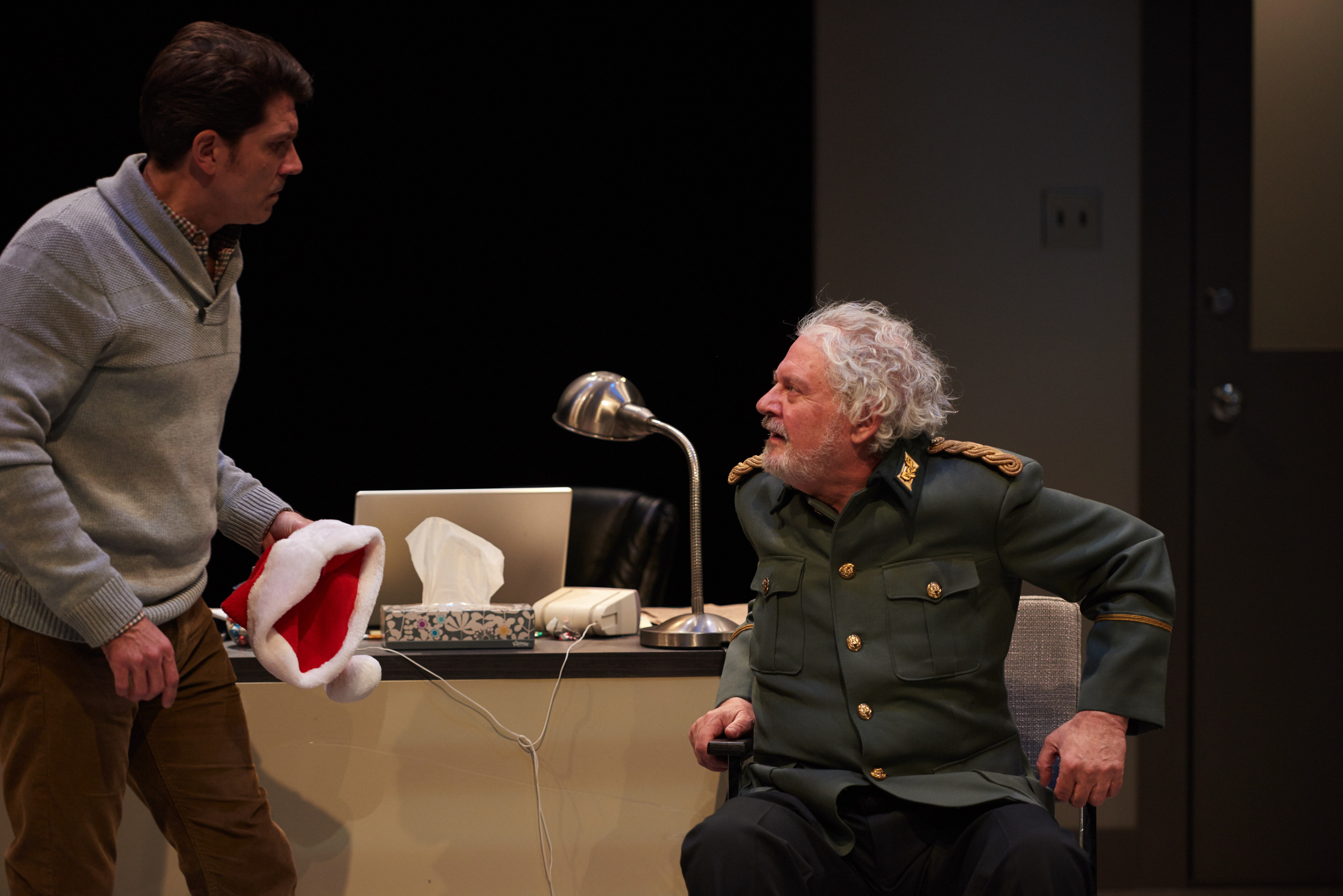
One example is when the old man is forced to confess his worst war crime. Most of what his character says is translated through the other characters, but in this case, as he describes his horrific, brutal actions, the audience can only rely on the reactions of other characters to interpret the severity and brutality of his actions.
This scene, where the audience was left to imagine the atrocities committed by a war criminal, was just one of many where I found myself cringing and feeling uncomfortable. It also served to illustrate how far-removed most Canadians are from the atrocities of war: even when someone is spelling them out for us, we still can't manage to comprehend what those experiences are like. It's like they're speaking another language.
Moving & thought-provoking
Lately it's hard not to feel like the whole world has become engulfed by fear and anger. From the recent Paris attacks, to the deplorable comments being shared across social media about Muslims and the Syrian refugees, it's terrifying to see how easily fear can enter our hearts, and stay there.
Butcher shows us how easily we can become consumed by our lust for revenge, and how even the most innocent among us can become twisted, mutated versions of ourselves when subjected to enough horrors and traumatic experiences. That when we treat others with hatred and fear, those people become permanently damaged or broken by it, and can only turn to more violence and hatred to try and fill the hole that our actions carved in them.
This idea, that the cycle of violence is a self-perpetuating process than can only be halted with deliberate kindness and forgiveness, was a powerful message which, I think, couldn't be more relevant to current global issues. Fear and division are powerful manipulative tools, and we have a responsibility to try and act better than the people who have mistreated us, or acted with hatred in their hearts.
With that in mind, I highly recommend that everyone check out Butcher while they can (it's running at the PTE until December 6, 2015). You won't be disappointed.
**I'd like to thank the Prairie Theatre Exchange once more for providing me with tickets to see this outstanding play. I was moved and humbled by Butcher, and can't recommend it enough.
